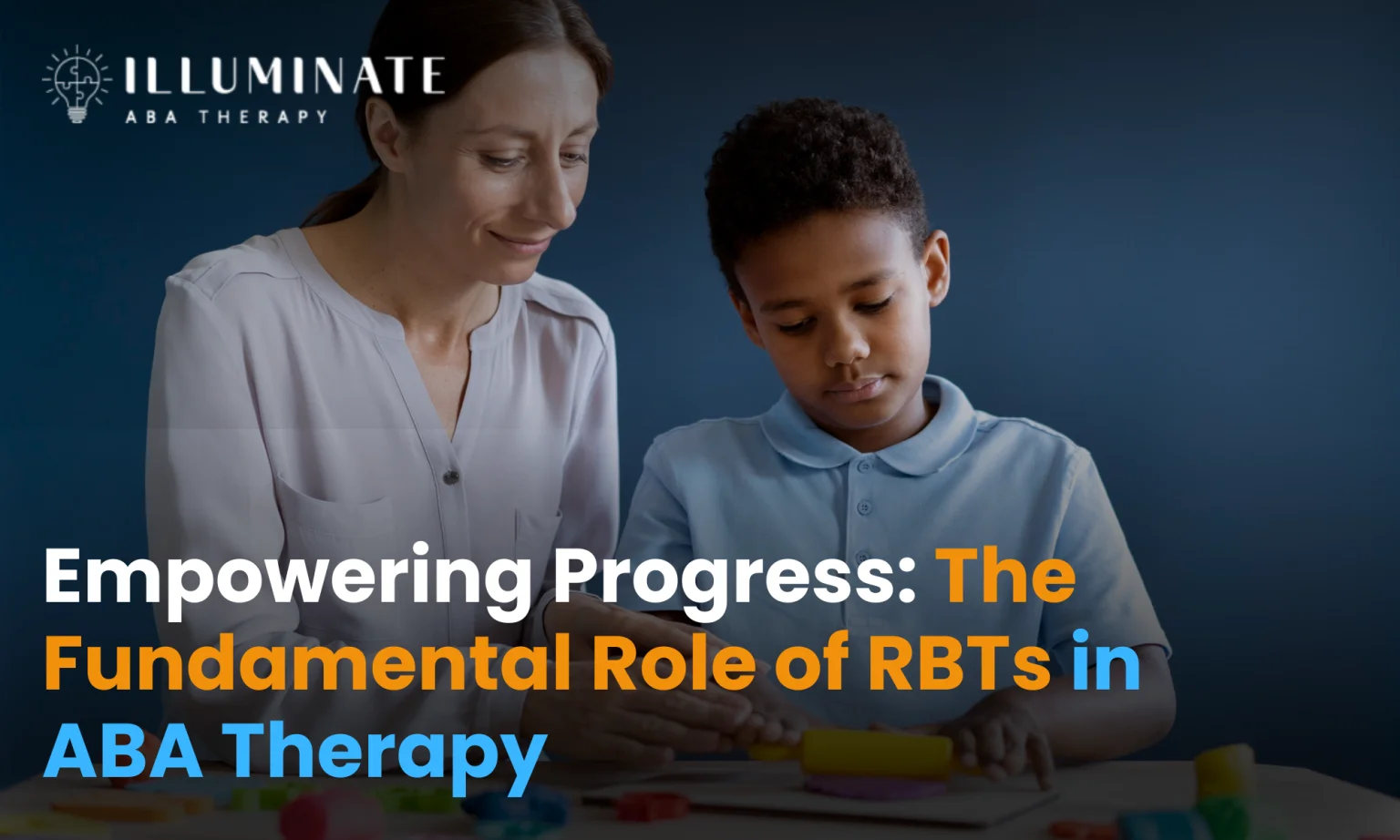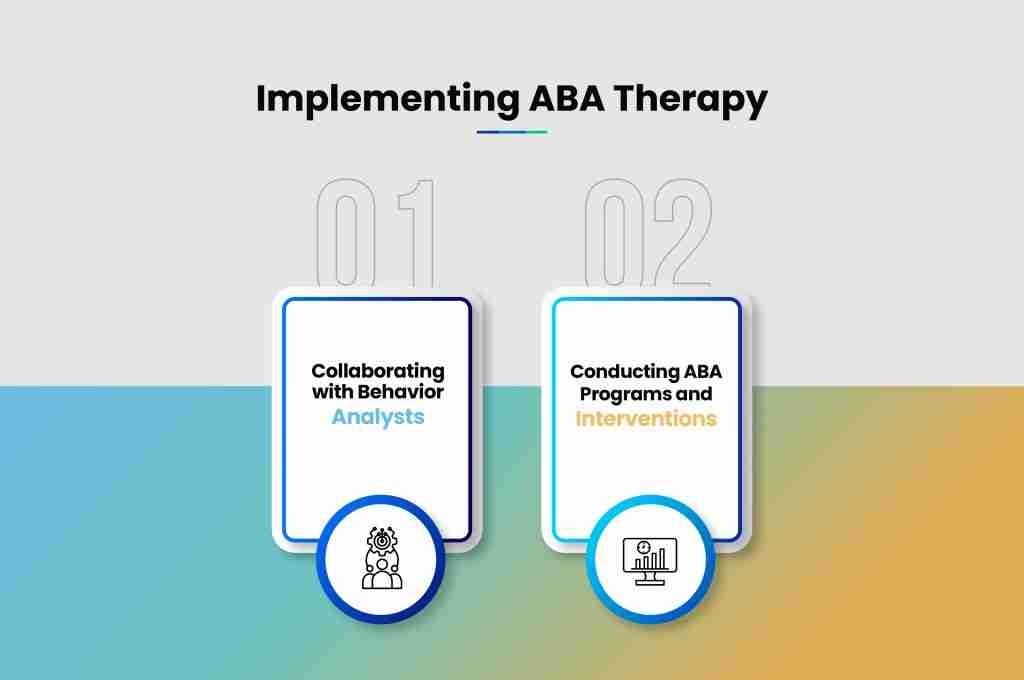Empowering Progress: The Fundamental Role of RBTs in ABA Therapy
ABA TherapyJuly 17, 2025

Understanding ABA Therapy
Applied Behavior Analysis (ABA) Therapy is a scientifically proven approach that focuses on understanding and improving behaviors, particularly in individuals with Autism Spectrum Disorder (ASD). Let's delve into the specifics of what ABA therapy entails and its significance for individuals with autism.
What is ABA Therapy?
ABA Therapy is a structured and goal-oriented intervention that aims to enhance meaningful behaviors and diminish behaviors that may be harmful or interfere with learning. It is based on the principles of behavior analysis to identify behavioral patterns and formulate tailored strategies to promote positive changes.
ABA therapists utilize various techniques, such as positive reinforcement, prompting, shaping, and systematic prompting, to teach and reinforce desired behaviors. By breaking down complex skills into manageable steps and providing consistent feedback, individuals with autism can develop functional skills and enhance their quality of life.
Importance of ABA Therapy for Individuals with Autism
For individuals with autism, ABA Therapy plays a pivotal role in improving communication, social interactions, and daily living skills. By focusing on behavior modification and skill acquisition, ABA Therapy empowers individuals to navigate social situations, manage emotions, and engage in meaningful activities independently.
Research has shown that early and intensive ABA interventions can lead to significant improvements in various areas, including language development, academic performance, and adaptive skills. By customizing therapy plans to meet the unique needs of each individual, ABA therapists can address specific challenges and foster positive outcomes.
The systematic approach of ABA Therapy, coupled with the dedication of Registered Behavior Technicians (RBTs) and behavior analysts, creates a supportive environment that nurtures growth and progress in individuals with autism. By incorporating evidence-based practices and individualized treatment plans, ABA Therapy continues to be a cornerstone in improving the lives of individuals with autism.
By understanding the essence of ABA Therapy and its profound impact on individuals with autism, we can appreciate the role of dedicated professionals in fostering growth, independence, and empowerment within the autism community.
Role of RBTs in ABA Therapy
Applied Behavior Analysis (ABA) therapy is a structured approach that aims to improve socially significant behaviors in individuals, particularly those with Autism Spectrum Disorder (ASD). Within the realm of ABA therapy, Registered Behavior Technicians (RBTs) play a fundamental role in providing direct support and implementing behavior plans.
Who are RBTs?
RBTs are professionals who have received specialized training in the field of behavior analysis. They work under the supervision of Board Certified Behavior Analysts (BCBAs) to deliver ABA interventions and support individuals with diverse behavioral needs. RBTs are closely involved in the implementation of behavior programs and play a key role in supporting the progress of individuals undergoing ABA therapy.
Responsibilities and Duties of RBTs
The responsibilities of RBTs in ABA therapy encompass a range of vital duties that contribute to the success of behavior intervention programs. Some of the key responsibilities include:
Responsibility
Description
Conducting Assessments
RBTs assist in conducting initial assessments to identify target behaviors and establish baseline data for intervention planning.
Implementing Behavior Plans
RBTs follow structured behavior plans designed by BCBAs to teach and reinforce positive behaviors and reduce unwanted behaviors.
Collecting Data
RBTs are responsible for collecting accurate and detailed data during therapy sessions to track progress and evaluate the effectiveness of interventions.
Providing Feedback
RBTs offer constructive feedback to individuals, families, and multidisciplinary teams involved in the therapy process to ensure consistency and effectiveness.
Communication
RBTs communicate regularly with BCBAs to report on progress, discuss challenges, and receive guidance on modifying intervention strategies as needed.
Continuous Professional Development
RBTs engage in ongoing training and professional development activities to enhance their skills and stay updated on best practices in ABA therapy.
By assuming these responsibilities, RBTs have a direct impact on the quality of services provided and the outcomes achieved for individuals receiving ABA therapy. Their role is not only essential in implementing behavior plans but also in fostering a supportive and empowering environment for individuals with ASD. For more insights into ABA therapy and collaborating with behavior analysts, refer to our article on how to effectively collaborate with schools for ABA support.
Implementing ABA Therapy

Once the foundation of ABA therapy is established, the vital stage of implementing the therapy comes into play. This involves the collaboration of Registered Behavior Technicians (RBTs) with Behavior Analysts to execute ABA programs and interventions effectively.
Collaborating with Behavior Analysts
Collaboration between RBTs and Behavior Analysts is essential for the success of ABA therapy. Behavior Analysts are responsible for creating individualized treatment plans based on the needs of their clients. They design behavior intervention strategies, set goals, and monitor progress over time.
RBTs work closely with Behavior Analysts to implement these treatment plans. They provide direct, one-on-one therapy to individuals with autism under the supervision of Behavior Analysts. RBTs play a crucial role in carrying out the strategies outlined in the treatment plan and collecting data on the individual's progress.
Effective communication and teamwork between RBTs and Behavior Analysts are key to ensuring that the ABA program aligns with the client's goals and objectives. Regular collaboration meetings and feedback sessions help optimize the therapy process and adjust strategies as needed. For more information on collaborating effectively with schools for ABA support, check out our article on how to effectively collaborate with schools for ABA support.
Conducting ABA Programs and Interventions
Once the treatment plan is in place, RBTs are responsible for the direct implementation of ABA programs and interventions. These programs are designed to target specific behaviors or skills that the individual needs to develop or improve. RBTs work closely with their clients to provide the necessary support and guidance during therapy sessions.
ABA programs may involve a variety of interventions, such as discrete trial training, naturalistic teaching strategies, and reinforcement techniques. RBTs use evidence-based practices to teach new skills, reduce challenging behaviors, and promote positive social interactions.
Data collection is a fundamental aspect of conducting ABA programs and interventions. RBTs systematically track and record the individual's responses to the interventions, progress towards goals, and any relevant behavioral data. This data is then used by Behavior Analysts to analyze the effectiveness of the treatment and make informed decisions about adjustments to the therapy plan.
By actively participating in the implementation of ABA programs and interventions, RBTs play a crucial role in supporting and empowering individuals with autism on their journey towards progress and development. Their dedication to delivering high-quality therapy and their commitment to the well-being of their clients make them invaluable members of the ABA therapy team.
Impact of RBTs in ABA Therapy
RBTs play a pivotal role in the implementation of ABA therapy, particularly in the areas of progress monitoring and data collection, as well as providing essential support and empowerment to individuals with autism.
Progress Monitoring and Data Collection
One of the key responsibilities of RBTs in ABA therapy is to closely monitor the progress of individuals with autism throughout their treatment. RBTs work collaboratively with behavior analysts to track and document the effectiveness of the ABA programs and interventions being implemented.
Through systematic data collection and analysis, RBTs are able to observe how individuals respond to different behavioral strategies and interventions. This data-driven approach allows RBTs to make informed decisions about adjusting and tailoring the treatment plans to better meet the specific needs and goals of each individual.
By meticulously documenting the progress made by individuals with autism, RBTs provide valuable insights that help shape the direction of therapy and ensure that interventions are tailored to promote positive outcomes. The data collected by RBTs also serves as a vital tool for evaluating the efficacy of the ABA programs and making evidence-based adjustments when needed.
Support and Empowerment for Individuals with Autism
In addition to progress monitoring, RBTs play a crucial role in providing ongoing support and empowerment to individuals with autism. RBTs work closely with clients to implement behavioral interventions, teach new skills, and support them in achieving their goals.
Through positive reinforcement and encouragement, RBTs create a safe and nurturing environment where individuals with autism can develop and thrive. RBTs help individuals build confidence, improve social interactions, and enhance their daily living skills, fostering greater independence and self-esteem.
By establishing a strong rapport and fostering a supportive relationship with their clients, RBTs create a foundation of trust that enables individuals with autism to engage more effectively in the therapy process. This support and encouragement are essential in empowering individuals with autism to reach their full potential and lead fulfilling lives.
The impact of RBTs in ABA therapy goes beyond just implementing interventions; they serve as mentors, advocates, and partners in the journey towards positive behavioral change and improved quality of life for individuals with autism. Through their dedication and commitment, RBTs play a fundamental role in promoting progress, independence, and empowerment for those they serve.
